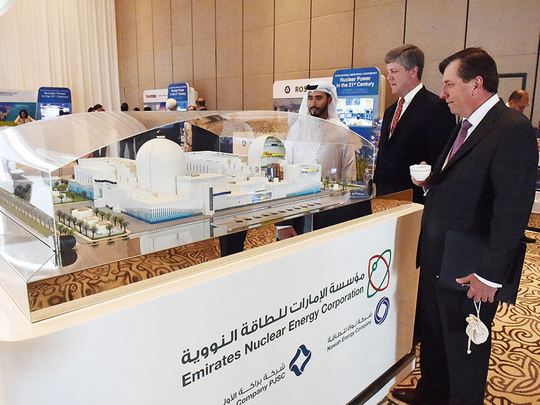
Abu Dhabi: At least 25 per cent of the UAE’s electricity will come from nuclear energy by 2021, said a top UAE official on Monday at a major international conference held in Abu Dhabi.
Organised by the International Atomic Energy Agency (IAEA) every four years, the International Ministerial Conference on Nuclear Power in the 21st Century brings together member states of the IAEA to discuss the importance of mitigating climate change by means of clean and sustainable energy sources — particularly nuclear power.
“We have now reached the final stages of construction for our first nuclear power plant with the commissioning process well underway. The construction of all four reactors continues to progress with an overall completion of 84 per cent,” said Suhail Mohammad Al Faraj Al Mazroui, UAE Minister of Energy and Industry.
“Once all reactors are fully operational, they will produce up to 25 per cent of the UAE’s energy needs by 2021,” he added.
“The UAE has made large headway in developing a nuclear energy plan, our country has modernised its infrastructure in this regard based on the guidelines of the IAEA as well as best international practices,” he said.
Al Mazroui spoke positively on the environmental aspects of nuclear energy, pointing to its low CO2 emissions.
“Nuclear energy is one of the lowest-carbon emitting energies, which makes it environmentally friendly for generating electricity. Today, there are about 448 nuclear reactors operating in 30 countries around the world, producing one-third of the world’s clean energy,” he said.
Al Mazroui also said that the UAE was committed to achieving a clean energy plan by 2050 that would see CO2 emissions being reduced by 70 per cent in the country.
“Earlier this year, we launched our national energy strategy for 2050, through which we aim to cut CO2 emissions by 70 per cent, and increase the use of clean energy by 50 per cent. Nuclear energy forms an integral part of our efforts to reduce CO2 emissions in our energy use,” he said.
Al Mazroui also stressed the UAE’s firm policy towards abiding by international frameworks for nuclear energy, and ensuring the non-proliferation of nuclear weapons.
“The UAE highly values the international nuclear cooperation framework as a crucial platform for strengthening safety and key required capabilities,” he said.
“Non-proliferation is a must for any country developing a peaceful nuclear energy programme,” he added.
Fukushima accident
Yukiya Amano, Director General, IAEA, said that gaining public confidence in nuclear power was still a challenge, in large part because of the Fukushima nuclear power plant accident that happened in Japan in 2011.
“In many countries public acceptance remains the main obstacle to be overcome in the use of nuclear power. Public confidence in the safety of nuclear power was deeply shaken by the Fukushima accident in 2011.
“The post-Fukushima IAEA action plan on nuclear safety made a valuable contribution to improving safety. Countries with nuclear power plants reassessed all aspects of safety and made improvements where necessary,” he added.
“[Another] key reason for public concern about nuclear power is the problem of nuclear waste. There exists perceptions that there isn’t a solution for nuclear waste, but despite this perception the nuclear industry has been managing [nuclear] waste disposal successfully for more than half a century,” he said, addressing another public concern with nuclear power.
“Dozens of storage facilities for low level and intermediary level [of] nuclear waste are in operation throughout the world,” he added.
Amano, who also visited Iran on Sunday, said that Iran is fulfilling its nuclear deal obligations under the terms of the Joint Comprehensive Plan of Action (JCPOA).
He said that he had called on the Iranian president to ensure that Iran continues to abide by its agreements under JCPOA.
Energy demands
William D. Magwood, director general, Nuclear Energy Agency of the Organisation for Economic Cooperation and Development, said that the future of meeting the world’s energy demands would be a major challenge, and even more so as the population continued to increase.
“The uncertainty about the future of energy is higher than it has ever been … The future energy portfolio of the world will need to adapt.
“The future energy portfolio must also reflect the aspirations of 1.2 billion people in the world today who are currently without access to electricity, and 2.7 billion people who lack clean cooking facilities,” he added.
“[We] will also need to respond to the 6.5 million people a year who die prematurely because of air pollution. These challenges are likely to grow, not shrink, as global populations expands from 7.5 billion people today to 10 billion [people] by 2050.”








